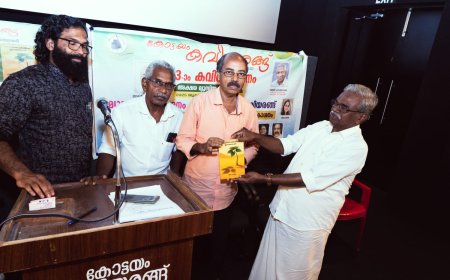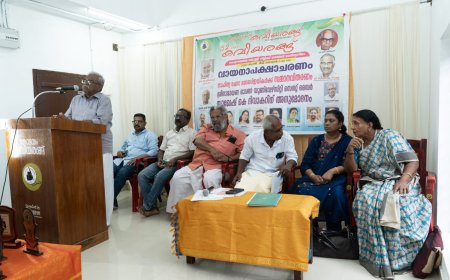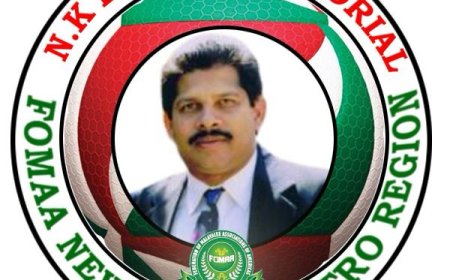Activists flay HC ruling that could deny travellers toilet access in fuel pumps
Follow TNM's WhatsApp channel for news updates and story links. The Kerala High Court has issued an interim order restraining the state government and local self-government bodies from compelling private petroleum retail outlets to convert their facilities into public toilets. The directive was passed by Justice CS Dias on June 18 while considering a writ petition by the Petroleum Traders Welfare and Legal Service Society (PTWLSS) along with five petroleum retailers. The petitioners argued that they were being forced to open toilets—originally meant for their customers—for public use, thereby violating Article 300A of the Indian Constitution, which protects individuals from being deprived of their property without legal authority. They specifically accused the Thiruvananthapuram Municipal Corporation of installing 'public toilet' signage outside certain retail fuel stations without permission. In a state where even basic toilet facilities are lacking on highways at the government level, a recent court verdict has drawn serious concern from activists, who say it could severely impact long-distance travel—particularly for women. On most highways, petrol pump washrooms are often the only accessible facilities. The ruling, however, threatens to restrict even this limited option. "The order should be reversed. Washrooms at petrol pumps are often the only toilets women can access during long journeys. There is no alternative available," said Advocate Sandhya, a women's rights activist, speaking to TNM. "Claiming petrol pumps are private property and using that to deny public access to washrooms is a narrow-minded view. Even private establishments have a social responsibility," she said. Tour operators and long-distance bus drivers have echoed similar concerns. "The only workaround is to refuel at every petrol pump when someone on the bus needs to use the toilet—but that’s just not practical. It’s true that providing toilet facilities is the government’s responsibility, but in all nearby states, it’s done with the cooperation of pump owners," said Anas, a tour operator based in Thiruvananthapuram. Drivers said toll plazas are the only other option available on highways, However, most of them either lack proper public toilet complexes or have facilities that are unusable. While activists and transport operators demand broader public access to fuel pump toilets, citing the lack of clean washroom facilities on highways, particularly for women, who are most affected - retail petroleum outlet owners have expressed their cautious support for the order. Their concerns focus on maintaining hygienic conditions in line with petroleum company guidelines and adhering to safety regulations set by the authorities. According to them, these washrooms are primarily intended for their customers, and allowing public access during urgent need is part of their social responsibility. However, making this a legal obligation often leads to crowding which creates safety issues in these high-risk zones. “We have no objection to the public using toilets at our outlets—it is a matter of social commitment. But converting our goodwill into a legal obligation is unacceptable,” said Rajan Vaikom, Vice Chairperson of PTWLSS, a 400-member Kerala-based Petroleum traders organisation. “Local self-government bodies have no authority to install boards on petroleum retail outlets, which are private properties. Ensuring public infrastructure is their responsibility, but they are simply shifting the burden onto us,” he told TNM. Petroleum retailers also cited concerns over hygiene and operational penalties. According to them, excessive public use often leads to unsanitary conditions, attracting huge fines from oil companies. They further argued that it becomes difficult to comply with safety regulations laid down by the Petroleum and Explosives Safety Organization (PESO) under such circumstances. In response, the Office of the Mayor, Thiruvananthapuram Corporation, said the Corporation plans to appeal the High Court's interim order. “We are working to ensure maximum public access to washroom facilities in both government and private institutions. This effort will be preceded by meetings with private organisations and associations,” the office stated. The installation of signage on petroleum premises was based on guidelines issued under the Swachh Bharat Mission, the office said. The controversy follows a 2013 circular from the Ministry of Road Transport and Highways, which directed that drinking water and toilet facilities at petrol outlets should remain accessible to the public around the clock. IIn April 2025, the District Consumer Disputes Redressal Commission in Pathanamthitta ordered a petroleum outlet in Payyoli, Pathanamthitta, to pay ₹1.65 lakh in compensation to a customer, Jayalekshmi, who was denied access to the toilet despite purchasing fuel from the outlet - in an incident that took place in May, 2024. After a detailed inquiry, the panel, c

Follow TNM's WhatsApp channel for news updates and story links.
THE Kerala High Court has issued an interim order restraining the state government and local self-government bodies from compelling private petroleum retail outlets to convert their facilities into public toilets.
The directive was passed by Justice CS Dias on June 18 while considering a writ petition by the Petroleum Traders Welfare and Legal Service Society (PTWLSS) along with five petroleum retailers.
The petitioners argued that they were being forced to open toilets—originally meant for their customers—for public use, thereby violating Article 300A of the Indian Constitution, which protects individuals from being deprived of their property without legal authority. They specifically accused the Thiruvananthapuram Municipal Corporation of installing 'public toilet' signage outside certain retail fuel stations without permission.
In a state where even basic toilet facilities are lacking on highways at the government level, a recent court verdict has drawn serious concern from activists, who say it could severely impact long-distance travel — particularly for women. On most highways, petrol pump washrooms are often the only accessible facilities. The ruling, however, threatens to restrict even this limited option.
"The order should be reversed. Washrooms at petrol pumps are often the only toilets women can access during long journeys. There is no alternative available," said Advocate Sandhya, a women's rights activist, speaking to TNM.
"Claiming petrol pumps are private property and using that to deny public access to washrooms is a narrow-minded view. Even private establishments have a social responsibility," she said.
Tour operators and long-distance bus drivers have echoed similar concerns.
"The only workaround is to refuel at every petrol pump when someone on the bus needs to use the toilet—but that’s just not practical. It’s true that providing toilet facilities is the government’s responsibility, but in all nearby states, it’s done with the cooperation of pump owners," said Anas, a tour operator based in Thiruvananthapuram.
Drivers said toll plazas are the only other option available on highways. However, most of them either lack proper public toilet complexes or have facilities that are unusable.
While activists and transport operators demand broader public access to fuel pump toilets, citing the lack of clean washroom facilities on highways, particularly for women, who are most affected - retail petroleum outlet owners have expressed their cautious support for the order. Their concerns focus on maintaining hygienic conditions in line with petroleum company guidelines and adhering to safety regulations set by the authorities.
According to them, these washrooms are primarily intended for their customers, and allowing public access during urgent need is part of their social responsibility. However, making this a legal obligation often leads to crowding which creates safety issues in these high-risk zones.
“We have no objection to the public using toilets at our outlets—it is a matter of social commitment. But converting our goodwill into a legal obligation is unacceptable,” said Rajan Vaikom, Vice Chairperson of PTWLSS, a 400-member Kerala-based Petroleum traders organisation. “Local self-government bodies have no authority to install boards on petroleum retail outlets, which are private properties. Ensuring public infrastructure is their responsibility, but they are simply shifting the burden onto us,” he told TNM.
Petroleum retailers also cited concerns over hygiene and operational penalties. According to them, excessive public use often leads to unsanitary conditions, attracting huge fines from oil companies. They further argued that it becomes difficult to comply with safety regulations laid down by the Petroleum and Explosives Safety Organization (PESO) under such circumstances.
In response, the Office of the Mayor, Thiruvananthapuram Corporation, said the corporation plans to appeal the High Court's interim order.
“We are working to ensure maximum public access to washroom facilities in both government and private institutions. This effort will be preceded by meetings with private organisations and associations,” the office stated.
The installation of signage on petroleum premises was based on guidelines issued under the Swachh Bharat Mission, the office said.
The controversy follows a 2013 circular from the Ministry of Road Transport and Highways, which directed that drinking water and toilet facilities at petrol outlets should remain accessible to the public around the clock.
IIn April 2025, the District Consumer Disputes Redressal Commission in Pathanamthitta ordered a petroleum outlet in Payyoli, Pathanamthitta, to pay ₹1.65 lakh in compensation to a customer, Jayalekshmi, who was denied access to the toilet despite purchasing fuel from the outlet - in an incident that took place in May 2024.
After a detailed inquiry, the panel, chaired by Baby Vechoochira, cited the Swachh Bharat Mission directives and guidelines from the Ministry of Petroleum in support of its ruling.









































































